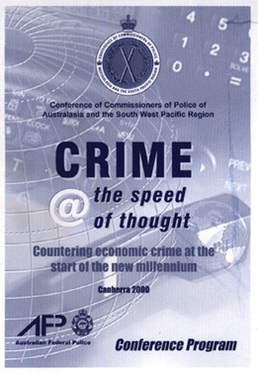

|
Home
| Databases
| WorldLII
| Search
| Feedback
Australian Federal Police - Platypus Journal/Magazine |
Commissioner's Conference wires up to short circuit electronic crime
by Steve Jiggins Director, Media & Public Relations
The AFP hosted this year's annual Police Commissioners' Conference which was attended by Police Commissioners from all Australian jurisdictions, New Zealand, Fiji, and Papua New Guinea and held in Canberra from March 13-17.
The theme of this year's Conference was Crime @ The Speed of Thought reflecting the concern by Commissioners about the exponential growth in information technology uptake and the opportunities this provides for criminal activity.
It is estimated that there will be 900 million people using the Internet by the end of 2000 and statistics show that Australians are among the world's leaders in adopting new technologies.
A 1999 Australian Bureau of Statistics study indicated that 3.2 million Australian households had access to the Internet and that nearly 5.5 million adults had accessed the Internet in the preceding 12 months.
People who abuse these technologies have the capacity to commit offences on a global basis with complete anonymity, with speed, and on a scale not previously encountered. Such criminal behaviour threatens the viability of key industries such as banking and tourism and can have a fundamental impact on the health and safety of the economy. For instance, credit card fraud is now a major concern worldwide.
The Commissioners stressed the vital role for law enforcement in ensuring strong commercial and community confidence, as well as economic stability and growth, while at the same time maintaining the rule of law.
In addition to the economic cost of e-crime, there are the human and social costs of crimes such as child pornography, racist propaganda and terrorism which are increasingly exploiting cyberspace.
Commissioners recognised that in order for law enforcement to meet the needs of government and the community, police agencies need to acquire new skills, tools and authorities, as well as continue to foster effective strategic partnerships to combat electronic crime.
The Conference Chair, AFP Commissioner Mick Palmer said:
“The challenge for law enforcement agencies now is to combat the new types of crimes as well as traditional crimes being committed using Internet and related technology”.
To better position law enforcement to ensure the integrity of government and business processes and community safety and security, Commissioners agreed to establish an Electronic Crime Steering Committee to evaluate Australasia's capacity to respond to electronic crime and to then develop an Australasian Law Enforcement Electronic Crime Strategy by June 30 this year.
The strategy will embrace:
• The development of an holistic and more coordinated approach to the issue of electronic crime.
• A strong emphasis on prevention, including industry and community education.
• Reducing the opportunity for e-crime through ‘target hardening' and designing out crime.
• The development of systems to prevent and detect hi-tech crime.
Commissioner Palmer emphasised that “a key element of the strategy will be developing partnerships with a range of stakeholders, including the private sector, which would look to resource sharing and enhanced cooperation with these groups”.
An example of this process is the need to develop, in close consultation with Internet Service Providers, appropriate regulation and protocols to enable the investigation of Internet-based crime.
Other areas that require priority examination are regulation and legislation to ensure that crime in cyberspace is adequately covered in the statutes; the identification, acquisition, development and retention of relevant technical skills; and the coordination of resources at a national, regional and international level.
Two of the papers presented at the Conference are reprinted in this edition of our journal.
The first paper is by Dr Peter Grabosky from the Australian Institute of Criminology. Dr Grabosky is a widely published author in the area of crime trends and his article provides an excellent overview of the move by criminals into cyberspace. His article examines the opportunities for criminal activity afforded by the new information technologies and the challenges these pose for industry, legislators and law enforcement.
The second paper is by Mr Alan Morris, Chairman of the Commonwealth Grants Commission. Mr Morris picks up many of the issues identified by Dr Grabosky and examines the potential impact of ‘cyber' criminal activity on the banking and financial systems.
The AFP appreciates the kind permission of both these authors to reprint their Conference papers.

To give readers a feel for the Commissioners' Conference we have included a collage of photographs in the centre spread, pages 22-23 showing some of the participants.
AustLII:
Copyright Policy
|
Disclaimers
|
Privacy Policy
|
Feedback
URL: http://www.austlii.edu.au/au/journals/AUFPPlatypus/2000/10.html